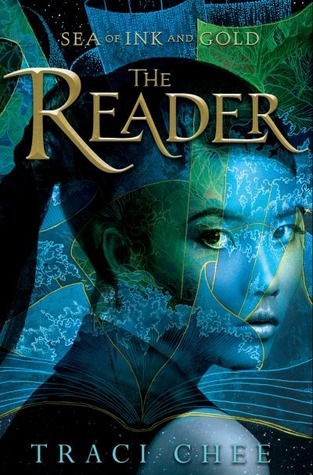 What an interesting start to a new YA fantasy series. The Reader follows Sefia, a teenager who's been on the run for most of her life with her aunt, Nan, following the murder of her father. In her possession, she has an object she's never encountered before, and hardly dared to look at--but when Nan is captured by the same people who killed Sefia's father, she looks into the object further and finds one thing that clearly defines the rest of her journey: This is a book.
What an interesting start to a new YA fantasy series. The Reader follows Sefia, a teenager who's been on the run for most of her life with her aunt, Nan, following the murder of her father. In her possession, she has an object she's never encountered before, and hardly dared to look at--but when Nan is captured by the same people who killed Sefia's father, she looks into the object further and finds one thing that clearly defines the rest of her journey: This is a book.See, Sefia lives in a world where things are not written down. Stories are passed down in an oral tradition, and if someone stops telling your story, you've essentially vanished from the world, forever. It's also a world that consist of islands and ocean, no large continents, which is a setting that I always like to see. But as Sefia begins to examine the book and slowly unlock its secrets, she also begins to unlock an interesting ability, one that allows her to read not only words on paper, but the very world and people around her: their pasts and their futures. And in the process she discovers Archer, a mute young man a year or two older than she who has been captured and forced to fight in the ring, and who Sefia frees and then can't get rid of as she continues to search for Nan and revenge for her father.
Meanwhile, there are two other stories going on: the story of Captain Reed and the Current of Faith, a privateer ship whose captain has led his crew to the edge of the world and beyond. His story unfolds simultaneously as part of the main narrative and as part of the book that Sefia reads. And then there's Lon, a young man who's taken to a library and inducted into its secrets, leading to an interesting duality in the story, because Lon is one of the people who works to keep books and the written word secret from the rest of the world, whereas Sefia is clearly out in the world. This would have been a very interesting duality to keep going through the rest of the series, but unfortunately it falls apart by the end of the book; I wish it had continued, because having real protagonists on both sides of the issue could have been a very compelling storyline and one very unusual in young adult fiction.
Sefia and Archer are both compelling characters for their backgrounds, and they reminded me a lot of Laia and Elias in Sabaa Tahir's An Ember in the Ashes, though the stories themselves are certainly different enough to merit reading (though there are some commonalities between them, as in many YA books these days). I do wish that Archer had remained a mute, however--that is such an unusual character trait that having it magically fixed at the end of the book was somewhat disappointing. I think that Chee did a very good job of having him being an interesting, compelling, and involved character without him ever actually speaking that it would have been nice to have it continued. I was actually hoping his loss of voice had something to do with his vocal cords being injured by the scarring around his neck rather than psychological trauma.
Anyway, the real strength of the story here is the intertwining of the stories. The layering of the stories from the book with what is actually happening in the world isn't an entirely new concept, but it's very well done and the layers work here in a way that enhances the whole rather than re-treading ground or being used as an unnecessary exposition device. Reed and his crew were awesome and I hope they continue to be prominent in future books. I think they were arguably more interesting than Sefia herself, and I would very happily read books just about them, though I didn't dislike Sefia.
Overall, this was a great YA story in an interesting world, but I think several of its best elements fell off at the end. I hope that Chee can manage to bring back what made it compelling in future books, though it might be hard because so many of the things that did it can't really be brought back without the story ceasing to make sense.
4 stars out of 5.
No comments:
Post a Comment